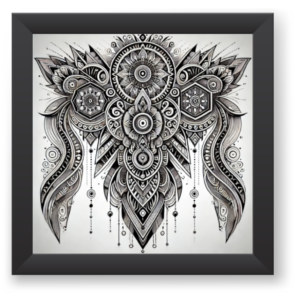Body Art Tattoo: A Timeless Canvas of Self-Expression and Storytelling
Body Art Tattoo
There are different types of body art. The history of body art is long-standing and deeply rooted in cultures worldwide as a form of self-expression, identity, and tradition. In recent years, body art, particularly tattoos, has gained significant popularity, evolving into a mainstream form of artistic expression.
Today, body art tattoo culture embraces diverse styles, techniques, and meanings, offering people a unique way to decorate their bodies and tell their stories. Let’s dive into different forms of body art and how tattoos stand out as the ultimate creative outlet on skin.
Types of Body Art
Before focusing on tattoos, it’s essential to recognize the spectrum of body art forms, each with its distinct techniques, cultural relevance, and purpose. Here are some popular types:
- Body Painting
Body painting uses temporary pigments and dyes, typically applied directly to the skin. Body painting is designed to wash off, making it ideal for performances, festivals, and themed events. Artists use their creativity to transform the human body into a canvas, often exploring abstract themes, vivid colors, and intricate designs. - Henna (Mehndi)
Henna is a temporary form of body art originating from South Asia and the Middle East, where it has been practiced for centuries. The paste, made from the henna plant, is applied in intricate designs that fade within weeks. Henna tattoos are common in cultural celebrations like weddings. Symbolizing luck, joy, and beauty. - Scarification
Scarification involves creating intentional scars on the skin. It has cultural significance in many African and Indigenous communities. Scarification is achieved by cutting or branding, and the resulting patterns or raised scars hold symbolic meanings unique to each culture. - Piercing
Body piercing is another popular form of body modification. Piercings allow individuals to express their style and identity, with a wide range of options, from traditional ear and nose piercings to more intricate body locations.
Body Art Tattoos: The Timeless Canvas of Ink
Among these forms of body art, tattoos have stood out as a lasting form of self-expression and artistic storytelling. The category body art tattoo, has evolved significantly, ranging from minimalist designs to intricate, large-scale pieces that span entire body parts. Here are some popular tattoo styles that have shaped the tattoo industry:
1. Traditional Tattoos
Traditional tattoos, often known as American traditional, are bold and iconic, with heavy outlines and bright colors. They typically feature classic designs like roses, anchors, and pin-up girls, celebrating American tattoo heritage.
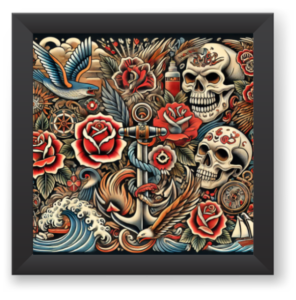
This design tells a story of strength, resilience, and timeless values rooted in classic tattoo symbolism. Anchors often represent stability and strength, suggesting a foundation that remains steady through life’s storms. Skulls symbolize mortality and the cycle of life and death, a reminder of both life’s fragility and the courage to face its end. Eagles represent freedom, power, and a warrior spirit, conveying themes of independence and self-reliance. Roses, with their vibrant colors, add elements of beauty and love, highlighting the balance between strength and gentleness. Together, these elements create a narrative about enduring life’s challenges with courage, cherishing love, and embracing freedom.
Each motif flows naturally into the next, weaving together a visual tale of life’s trials and the values that keep us grounded through them. The overall effect is a rich story of the journey through life, marked by resilience, beauty, and a fierce commitment to one’s path.

This traditional-style tattoo design tells a story of resilience, patriotism, and the powerful interplay between life, strength, and honor. Each element contributes to a cohesive narrative:
- Eagle: A symbol of freedom, power, and pride, often associated with patriotic themes, particularly in American traditional tattoos. The eagle’s outstretched wings and intense expression convey courage and vigilance.
- Anchor: Represents stability and grounding, often associated with sailors and those who find strength in staying rooted, even amidst turbulent times.
- Skull: A reminder of mortality, symbolizing bravery in the face of death and the appreciation of life’s fleeting nature.
- Roses: Symbolize beauty, love, and the ability to thrive despite challenges. In this context, they may represent the beauty in strength and resilience.
- Dagger: Represents protection, strength, and the willingness to face life’s battles.
- Ribbon and Stripes: With colors reminiscent of a flag, the ribbon ties into the patriotic theme, adding a sense of loyalty and pride.
Together, these elements create a powerful visual tale about honor, the courage to stand strong in the face of adversity, and the enduring beauty of resilience and patriotism. This tattoo celebrates the ideals of strength, loyalty, and a deep connection to roots and values.
2. Black and Grey Tattoos
Using only shades of black and grey, these tattoos emphasize shading and contrast to create a realistic, photo-like effect. From portraits to complex scenery, black and grey tattoos showcase impressive depth and detail.

This black and grey tattoo design tells a story of life’s fleeting nature, the inevitability of time, and the beauty found in embracing both. The hourglass symbolizes the passage of time, a reminder that moments are finite, and every grain of sand represents both past memories and future hopes slipping away. Skulls in the design speak to mortality, capturing the idea that life is precious precisely because it is temporary. Roses add a layer of complexity, symbolizing beauty amidst impermanence, growth, and the intertwining of life and death.
The raven often embodies mystery, transformation, and insight into the unknown, suggesting a journey into self-discovery and wisdom gained through life’s experiences. Together, the elements evoke themes of endurance, acceptance, and the profound beauty found in each phase of life. Shadows and fine lines enhance the narrative, creating depth and dimensionality that reflects the layered nature of existence. The design is a tribute to the timeless dance between life and death, urging the wearer to appreciate each moment fully.
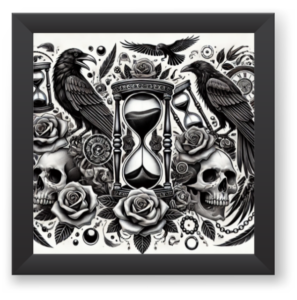
This black and grey tattoo design tells a story of time, mortality, and transformation. Each element carries a symbolic meaning that weaves together to create a narrative about the passage of life and the inevitability of change.
- Hourglass: Represents the passage of time, reminding us of life’s fleeting nature and the importance of each moment. The hourglass is a traditional symbol of mortality, signifying that time is running out and that every life has an endpoint.
- Skulls: Symbolize mortality and the transient nature of human life. Together with the hourglass, they reinforce the theme of impermanence and the inevitability of death.
- Ravens: Known as symbols of mystery, transformation, and the afterlife, ravens add a spiritual layer to the story. They suggest wisdom gained from understanding life’s transitory nature, as well as a connection to the unknown.
- Roses: Often symbolize beauty, love, and resilience. Here, they remind us of the beauty that can exist alongside themes of mortality, emphasizing that life, though fleeting, has moments of grace and beauty.
- Chains and Rings: Could represent the cycles and connections of life, binding moments, people, or experiences together. They may also suggest the bonds we create in life and how they persist, even after death.
Together, these elements craft a powerful message about embracing the present, acknowledging the inevitability of death, and finding beauty in every phase of existence. This design reflects a deep respect for the cycles of life and an appreciation for the transformative nature of time.
3. Neo-Traditional Tattoos
Neo-traditional tattoos take the bold lines and classic motifs of traditional tattoos but add modern flair with intricate details and expanded color palettes. Neo-traditional art emphasizes realism while preserving the boldness of traditional tattoo art.
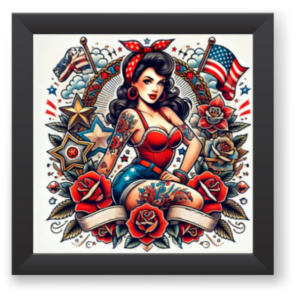
This design tells a story of timeless Americana, celebrating the spirit of freedom, resilience, and beauty that defines classic pin-up culture. The central pin-up girl embodies both strength and elegance, a nod to vintage aesthetics with a modern twist. Surrounding her are iconic symbols like stars, roses, and the American flag, which connect her to themes of patriotism, nostalgia, and the enduring allure of the American dream.
The banners and ornate elements in the background create a sense of pride and tradition, while the roses add layers of romance and timeless beauty. Each element—whether it’s the flag waving in the background or the vibrant, bold stars—symbolizes the unity of past and present, illustrating how tattoo art has evolved but remains connected to its roots. This design celebrates the dynamic nature of tattoo culture, showing how it can reflect both personal identity and cultural heritage. It’s a tribute to the iconic pin-up girl, a symbol of confidence and charm that resonates across generations.

4. Minimalist Tattoos
With a focus on simplicity, minimalist tattoos use fine lines, small shapes, or simple symbols. These tattoos are often more subtle, but they can be powerful in conveying personal meaning or artistic taste without occupying large areas.

5. Watercolor Tattoos
Emulating the look of watercolor paintings, these tattoos bring splashes of color and gradient effects that appear to flow seamlessly on the skin. Watercolor tattoos are known for their vibrant, soft appearance and often feature natural themes like flowers, animals, or landscapes.
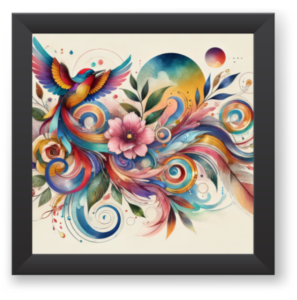
This watercolor tattoo design tells a story of freedom, transformation, and the vibrant beauty of life’s journey. The central bird, with its colorful wings spread, symbolizes freedom and the desire to explore and transcend limitations. Birds often represent the spirit’s journey and aspirations, suggesting a quest for new horizons and personal growth.
The surrounding flowers and leaves emphasize themes of natural beauty, renewal, and the cyclical nature of life, as flowers bloom, flourish, and eventually fade. The flowing, abstract shapes echo the currents of life—ever-changing, dynamic, and full of energy. The swirling patterns hint at the interconnectedness of all things, blending individual elements into a harmonious whole.
Together, the elements create a narrative of embracing change, celebrating the beauty found in each moment, and understanding that life’s path is a continuous, colorful journey filled with growth, discovery, and transformation. This design invites the wearer to embrace their personal evolution, free of boundaries, with grace and vitality.

This vibrant, watercolor-style tattoo design tells a story of freedom, growth, and the beauty of transformation. Each element within the composition adds to a narrative that emphasizes the journey of self-discovery and the connection between the natural and spiritual worlds.
- Colorful Bird (Possibly a Phoenix): The bird, with its wings spread wide in vivid colors, represents freedom, renewal, and transformation. If it is intended as a phoenix, it symbolizes rebirth and rising from challenges, embodying resilience and the ability to start anew.
- Flowing Leaves and Feathers: These elements add a sense of fluidity and movement, symbolizing growth, evolution, and the continual flow of life. The leaves suggest a connection to nature and the earth, grounding the design in a harmonious balance between earth and sky.
- Floral Elements (Sunflower, Other Flowers): Flowers in this design signify beauty, growth, and life’s fleeting, delicate moments. The sunflower, known for its strength and ability to turn towards the light, adds a hopeful and positive touch, representing resilience and optimism.
- Abstract Swirls and Spirals: The spirals and swirls represent cycles, continuity, and the infinite nature of life. They may also signify inner exploration and self-discovery, as spirals often symbolize a journey inward, suggesting that true transformation begins within.
- Soft Watercolor Blending: The watercolor effect gives the design a dreamlike quality, enhancing the sense of fluidity and organic growth. It suggests that life is a canvas where colors blend, evolve, and change, emphasizing adaptability and openness to new experiences.
- Geometric Circles and Patterns: The circular elements add balance and symmetry, symbolizing harmony, unity, and the interconnectedness of all things. They provide structure within the free-flowing design, representing the balance between chaos and order, spontaneity and grounding.
Overall, this design tells a story of a person who values freedom, transformation, and personal growth. It embodies the idea that life is a journey of continual rebirth and exploration, filled with moments of beauty, strength, and interconnectedness. It celebrates the individual’s resilience, adaptability, and willingness to embrace change, finding beauty in every phase of life.
6. Geometric Tattoos
Geometric tattoos rely on precise lines, patterns, and shapes to create symmetrical designs. They are popular for their versatility and ability to incorporate abstract ideas or meaningful symbols in intricate detail.

This geometric tattoo design tells a story of unity, order, and the interwoven nature of existence. The use of symmetrical shapes like triangles, circles, and hexagons symbolizes balance and harmony, representing the idea that all elements in life are interconnected. Mandala patterns and repeating shapes reflect the cycle of life and the concept of transformation—how each element evolves and fits perfectly within a larger, universal pattern.
The flow between geometric shapes suggests that life is a cohesive journey, each moment, decision, or experience connected to the next. This design embodies themes of stability and self-discovery, with every angle and curve coming together to represent personal growth and enlightenment, creating a visual journey through order, balance, and infinite possibility.

This intricate geometric tattoo design tells a story of balance, interconnectedness, and the pursuit of inner harmony. The highly detailed, symmetrical patterns suggest themes of structure and unity within the universe, as well as a journey inward to uncover layers of meaning and self-discovery.
- Central Mandala: The mandala at the core of the design represents completeness and the universe. Mandalas are symbolic of the self and the journey to find inner peace and wholeness. This central position suggests that the core of life’s journey is self-understanding and spiritual awakening.
- Symmetrical Patterns and Geometric Shapes: The intricate, repeating shapes and patterns convey a sense of order and balance. They illustrate the interconnected nature of existence, where each part contributes to the whole. The use of triangles, circles, and stars reinforces concepts of unity, stability, and growth.
- Layers of Complexity: The layered approach of the design reflects the multifaceted nature of life and the individual. Each layer represents different aspects of self or phases of personal growth, suggesting that one must look deeper to discover the full essence of being.
- Sacred Geometry Symbols: The inclusion of symbols from sacred geometry (such as hexagons, circles, and triangles) indicates a spiritual connection and respect for the order of the universe. These shapes symbolize harmony, balance, and the belief that certain patterns resonate throughout nature and life.
- Lines and Flowing Details: These elements create a sense of movement and connectivity, as if every part of the design is linked to the other. It represents how all things are connected—our actions, thoughts, and energies contribute to a larger whole.
This design tells a story of an individual who seeks balance and understanding through self-reflection and connection with universal principles. It symbolizes a journey of personal evolution, where harmony is achieved by aligning with the natural rhythms and structures of life. In essence, it is a celebration of inner peace, interconnectedness, and the beauty of finding one’s place within the larger cosmos.
Final Thoughts
Body art tattoos continue to grow in popularity and respect as a legitimate form of art, breaking boundaries and shifting perceptions worldwide. Whether through minimalist designs or elaborate full-body creations, tattoos allow individuals to transform their skin into a living canvas. Some people choose tattoos to mark significant milestones or life changes, while others might wear designs that honor family heritage, personal beliefs, or artistic inclinations. capturing personal stories, beliefs, and beauty for years to come. Whether you’re considering a small, meaningful tattoo or a large, intricate piece, body art tattoos offer a powerful way to wear your personality and history proudly on your skin. Offering individuals a limitless opportunity to express themselves authentically.
